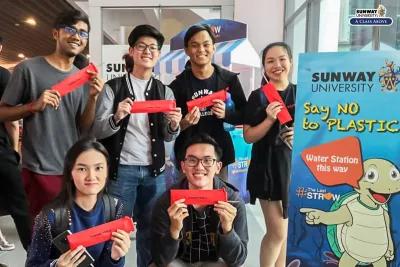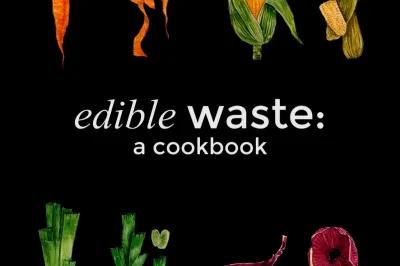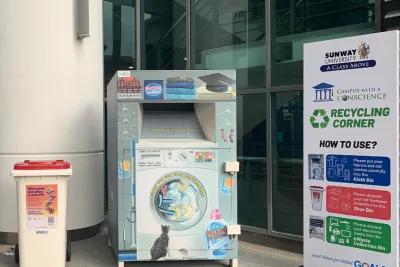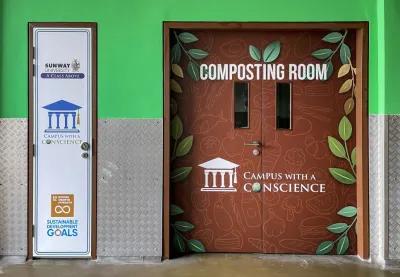Our 3RC Program (Reduce, Reuse, Recycle, Compost) is to support positive learning when managing our waste. While many people are familiar with the term '3R', there is an extra lesser know 'R' in the waste hierarchy-
Refuse.
It is the first major action we need to take, that is, avoid generating unnecessary waste by refusing it altogether.
With that in mind, we can now move onto the main 3Rs + C:
- Reduce
The second action is to Reduce which is to make mindful consumption decisions to reduce harmful waste. The University advocates a zero-waste lifestyle through annual campaigns, regularly featuring zero-waste vendors at sustainability bazaars on campus, as well as enforcing a complete ban of the sale of single-use plastic straws, water bottles and cutleries on campus.
Find out how much waste you produce.
- Reuse
The third action is Reuse which is to repurpose existing items that we own. Waste-to-wealth is an important concept emphasised through activities such as "Fashion Farm", "Plastic to bricks", "Upcycling workshops" and many more.
- Recycle
The final action is to properly sort the waste that we cannot avoid or reuse so that recyclable waste do not end up at landfills. As consumers, we exercise our dollar-vote by choosing to purchase items with recyclable packaging where available.
Check out the Trashpedia of what is recycleable.. or not.- Compost
Not forgetting the C in 3RC, compost your food waste! Composting is the process that converts organic materials into a nutrient-rich soil amendment through natural decomposition. Find out where your nearest community compost bins are located! Or better still, try it yourself at home. Explore these guides.
A beginners guide to composting at home
Guide to indoor composting
Here's a list of what you can compost
Find out how to participate in this program and manage your waste (on campus and outside!) below.

Reduce
Sustainable IT
ITS Services has been an early pioneer of sustainability with sustainable IT. With the ThinkB4Print campaign, sustainable practices of printing such as dual printing has been implemented to those making use of printing facilities on campus.
- #TheLastStrawCampaign 2019 -2022
2019 TheLastStrawCampaign started out as a community effort to reduce the use of Single-Use Plastic straws amongst students, staff and vendors on campus.
2022 Our campus has progressed to no Single-Use Plastic cutlery of any kind including plates, cups, etc.

Reuse
Edible waste: a cookbook
Inspired by Worldchefs’ Feed the Planet initiatives, the Sunway University Young Chefs recently published a digital cookbook on transforming edible food waste into new dishes. Although food waste could be converted into compost; the Young Chefs have tried to repurpose edible food waste such as vegetable peels and scraps, into a new dish before it reaches the bins. According to project lead Chef Soon Pau Voon, “the recipes shared in this digital cookbook reflect some of the practices in the culinary labs which can be easily reproduced in home kitchens.”
Try out some recipes in your own kitchen before throwing that food waste in the bin.

Recycle on Campus!
Recycling Bins
Recycling bins can be found all throughout the campus. Each level has waste separation bins with clear signage to educate the campus citizens towards responsibly recycling.
E-Waste Bins
Look out for e-Waste bins in recycle corners around campus. There are two Recycle Corners that can be found at Level G, University Building
Boulevard, College Building Bins for both large and small e-Waste items are available.
Kloth Cares Fabric Recycling Movement
This project is in collaboration with Kloth Cares and the Selangor Youth Community - SAY Community, in support of the United Nations Sustainable Development Goals ea (SDGs). Donations were collected and recycled by Life Line Clothing Malaysia (LLCM).
You can find the Cloth bin at the Recycle Corners:
- Level G, University Building
- Boulevard area, College Building
Where to Recycle in Klang Valley
Use Erth App to find the nearest recycle corner to you or have your recycled waste picked up where you are.

Compost
Composting Room
University food waste from kitchen scraps are collected daily for composting. The composting machine uses a Rapid Thermophilic Digestion method to breakdown organic materials into compost. The Cafeteria tenants also have an opportunity to participate in this composting initiative and learn the whole process of food composting. The campus cleaners are also educated to assist in the collection of the food waste and assist in the composting process.
Composted food waste is used as fertiliser for our Herb Garden and landscape around campus. The herbs are then used as culinary ingredients.
In Collaboration with..
Sunway Environmental Society
Together with this student-led society, we want to ensure you take action correctly and responsibly, to make each step you take as meaningful as possible.
Why should we Recycle?
1) Minimises Pollution
2) Protects The Environment
3) Minimises Global Warming
4) Cuts Down Landfill Waste
- Recycle Responsibly
- Wash your containers before throwing them into the bin so that you don't contaminate the rest of the waste.
- Only recycle plastic items that have the numbers 1 to 7 on the packaging. Typically, plastics 1. 2 and 5 are easily accepted by recyclers.
- The most responsible way to recycle is to avoid generating unnecessary waste to begin with. Avoid plastics, especially single-use plastics if you can.



